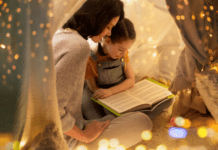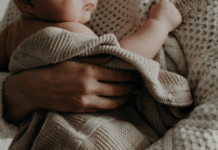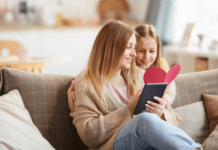 I start my day with approximately 34 questions from my 5-year-old before I’ve even had the chance to put my K-cup in the coffee maker. My 20-month-old is now doing this really cute thing where she likes to kick me directly in the face if I try to comfort her when she’s upset.
I start my day with approximately 34 questions from my 5-year-old before I’ve even had the chance to put my K-cup in the coffee maker. My 20-month-old is now doing this really cute thing where she likes to kick me directly in the face if I try to comfort her when she’s upset.
Mommin’ ain’t easy; add to that the fact that I spend my workday brainstorming through behavior problems and kid-related stress with other moms and dads as an early interventionist, and [someone who’s not a parent] could conceivably imagine that kids as a group would be one I generally dislike.
Of course, as a writer for a parenting website and a passionate member of the field of speech pathology, you’ve probably guessed that this isn’t true for me. I’ve always had the heart to see the innocence and wonder of a child, and I’ve had the privilege to be taught by a mother who is at her best when patiently and gently parenting a tiny human.
I arrived in my feminist circles as almost an odd-one-out. Early on in my conversations there, I took a casual “Oh yeah, I can’t stand kids,” as an inevitable part of people, especially women and femmes, being affirmed in their choice to be childless. If you pushed back on someone’s opinion, then obviously you weren’t a “good” feminist.
I’m here to challenge that assertion.
You can enthusiastically endorse a person’s reproductive choices (or not question them at all), and still expect someone who doesn’t want children to use language that affirms and respects the humanity in a child.
The World Health Organization estimates that over 1 billion children per year experience domestic violence in the form of physical, sexual, emotional, or psychological abuse or neglect. That number is HALF of the children ages 2-17 currently inhabiting the planet. We have some wonderful advocacy groups working to reduce or prevent violence against children, but as a society, we need to adopt cultural practices that reflect our commitment to end the mistreatment of our babies.
Just try plugging in the name of any other marginalized group to the statement: “Oh, I can’t stand women.” “Oh, I can’t stand queer people.” “Oh, I can’t stand people of color.”
Culturally, I hope we would not accept these sentiments that reek so strongly of hatred. So why, then, would we accept it on behalf of the humans who are our future? By allowing the normalization of disliking children to continue, we are saying that it’s okay to discriminate if a human is too loud, too energetic, too curious, too whiny, or too unpredictable. I can’t miss the opportunity here to say that this is strikingly similar to what members of the disability community experience. Living life outside of what is considered “normal”, “acceptable” or “convenient” for neurotypical adults is always going to be an exercise in advocacy.
I can already hear some of you making rumblings about how you didn’t like children until your own, or how you don’t like any children BUT your own, so let me speak to that. Lacking knowledge about how to interact with kids, being overstimulated when *some* children get overly active, being fearful or unsure of how a child is going to react to you: all of those are very common and valid complaints and not the object of this diatribe.
All of us have been annoyed at our children, upset at our children, or blood-boiling angry at our children, but none of us has the right to generalize a stereotype about children’s behavior in order to justify a dislike (read: hate) for them as a whole.
Seeing the world through a child’s eyes is a sacred privilege, one bound to alter your perception of the world if you are open to receiving the change. Often children are seen as immature or incomplete adults, instead of persons in their own right. “Children are meant to be seen and not heard,” is still a pervasive sentiment among modern families, even though espousing this attitude is a direct means of devaluing a child’s place in society.
This is not to say that children don’t need firm boundaries, but the same could be said of people at any age. As parents, we need to demand that the world speak respectfully about our most precious blessings. As humans, we need to hold each other to a higher standard of equal treatment for all other humans.



















Yesssss!!!
Wow what a shift in the way of thinking. Thank you for these words. I needed them today.